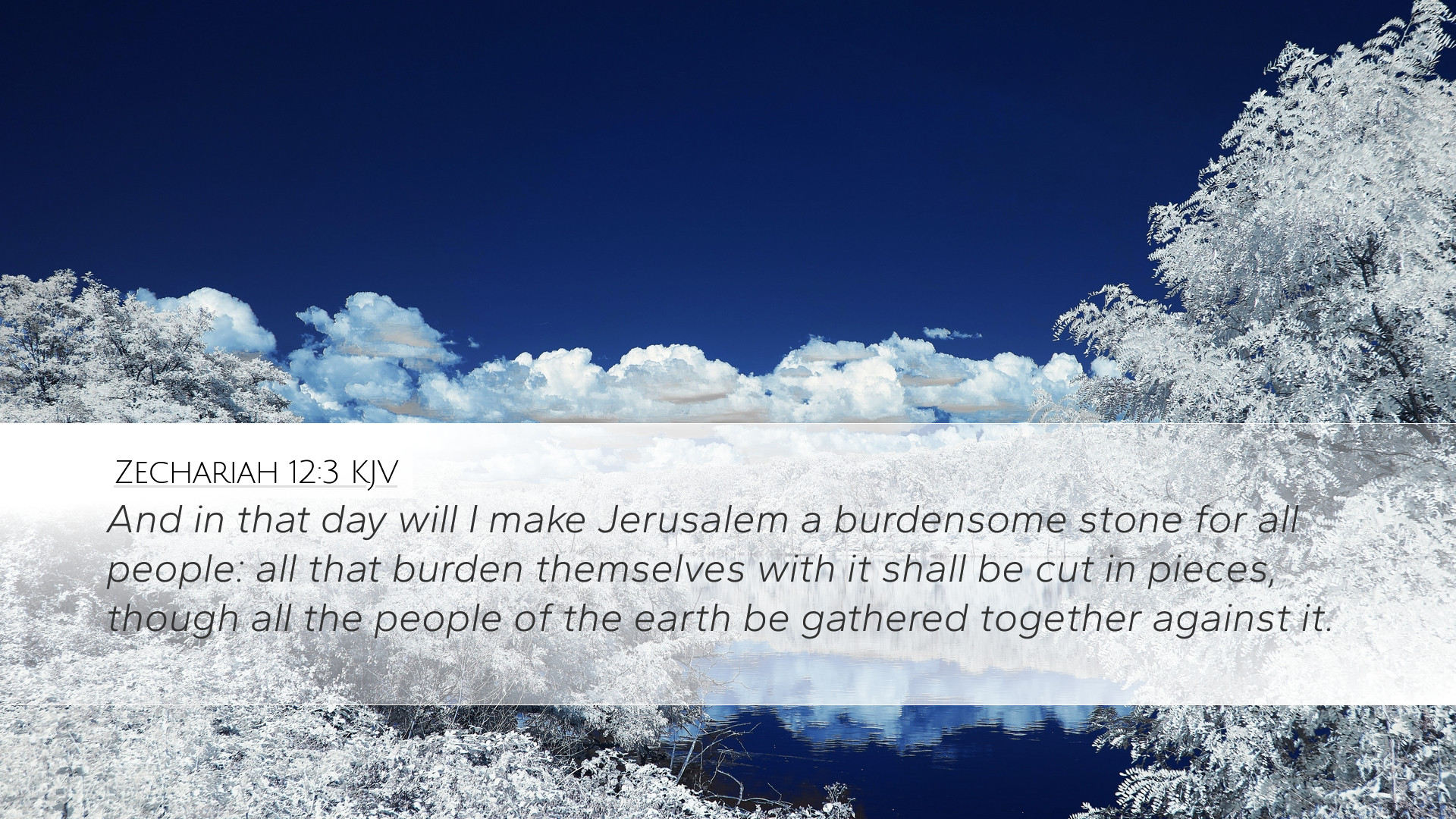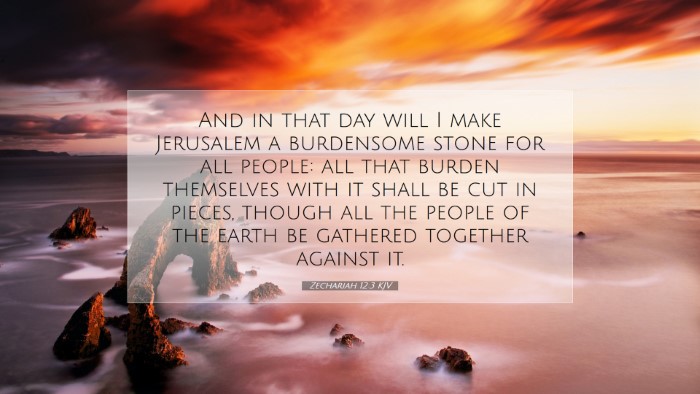Old Testament
Genesis Exodus Leviticus Numbers Deuteronomy Joshua Judges Ruth 1 Samuel 2 Samuel 1 Kings 2 Kings 1 Chronicles 2 Chronicles Ezra Nehemiah Esther Job Psalms Proverbs Ecclesiastes Song of Solomon Isaiah Jeremiah Lamentations Ezekiel Daniel Hosea Joel Amos Obadiah Jonah Micah Nahum Habakkuk Zephaniah Haggai Zechariah MalachiZechariah 12:3
Zechariah 12:3 KJV
And in that day will I make Jerusalem a burdensome stone for all people: all that burden themselves with it shall be cut in pieces, though all the people of the earth be gathered together against it.
Zechariah 12:3 Bible Commentary
Commentary on Zechariah 12:3
Verse: “And it shall come to pass in that day, that I will make Jerusalem a burdensome stone for all people: all that burden themselves with it shall be cut in pieces, though all the people of the earth be gathered together against it.” (Zechariah 12:3, KJV)
Introduction
This verse presents a profound declaration concerning Jerusalem’s centrality in God's redemptive history. It elaborates on the consequences of opposing the city and serves as a critical point for understanding the eschatological themes within Zechariah's prophecy.
Contextual Analysis
The historical backdrop of Zechariah’s prophecy is crucial. In the sixth century BC, after the Babylonian exile, the people of Israel faced significant spiritual and political challenges. Zechariah prophesied during a time when the temple was being rebuilt and God was re-establishing His people in their land.
Significance of Jerusalem
Jerusalem is not merely a physical location; it represents God's chosen place for His name to dwell, the center of divine worship, and the site of crucial future events in salvation history.
Thematic Insights
1. Jerusalem as a Burdensome Stone
In this verse, Jerusalem is depicted as a "burdensome stone," which suggests its heavy spiritual significance and the weight of the responsibility it entails. Those who harbor animosity against Jerusalem or burden themselves with the burdens of conflict will face dire consequences.
Matthew Henry's Perspective
Matthew Henry emphasizes that Jerusalem, representing the people of God, becomes a point of contention for the nations. The imagery of a burdensome stone signifies the challenges and struggles faced by those who oppose God's sovereign plan. The verse suggests that defiance against Jerusalem ultimately leads to self-destruction.
Albert Barnes' Commentary
Albert Barnes underscores the certainty of divine judgment against those who oppose Jerusalem. He notes that the phrase “cut in pieces” reflects the irreversible downfall awaiting those who antagonize God’s purposes. Jerusalem's significance lies not only in its geographical location but also in its theological implications as the heart of God's covenant with His people.
Adam Clarke's Insights
Adam Clarke adds that the “day” referenced signifies a time of divine intervention and transformation. He interprets the burdensome nature of Jerusalem as a test of faith and loyalty for the nations, where pride and rebellion result in tragedy.
Theological Implications
This verse carries profound theological implications regarding the sovereignty of God and the fate of nations. It not only admonishes adversaries of Jerusalem but also reassures God’s people of His protection and ultimate victory. The phrase “all the people of the earth” represents a universal confrontation of human arrogance against the divine order.
- God's Sovereignty: The verse affirms God’s control over history, indicating that even the mighty will ultimately submit to His will.
- Judgment and Responsibility: The burden of conflict is not merely a physical struggle but carries spiritual consequences, highlighting humanity's responsibility towards God’s plans.
- Hope for the Faithful: For believers, the language of burden is also a call to faithfulness. God will ultimately defend His people and fulfill His promises.
Application for Today
Zechariah 12:3 invites pastors, students, and theologians to reflect on the contemporary significance of Jerusalem in biblical prophecy and eschatology. The call to recognize Jerusalem's profound spiritual importance remains relevant, as it is often central in discussions on God’s ongoing covenant with His people and the culmination of history in Christ.
For Pastors:
This passage serves as a foundation for sermons that emphasize the importance of standing firm in faith amid societal opposition. It provides a powerful reminder of the divine consequences of engaging in spiritual conflict without reverence for God’s purposes.
For Students and Scholars:
Scholars are encouraged to analyze the historical context of Zechariah’s prophecy within the broader narrative of Scripture. This verse can be explored through various theological frameworks, including eschatology and soteriology, offering rich material for debate and discussion.
Conclusion
In summary, Zechariah 12:3 is a vivid prophetic declaration highlighting the significance of Jerusalem as a focal point of both conflict and divine purpose. Understanding this verse encourages deeper insights into God's sovereignty and the call to faithfulness for His people in facing earthly challenges.


